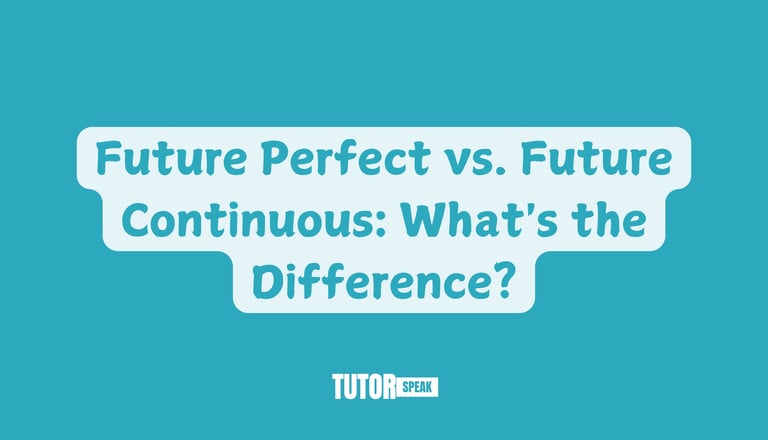Future Perfect vs. Future Continuous: What's the Difference?
The Future Perfect and Future Continuous are two tenses used to describe actions that will happen in the future. Though they both focus on future events, they express different aspects of time and intention. In this article, we will explore the differences between Future Perfect and Future Continuous, provide clear explanations, offer examples, correct common mistakes, and give exercises to help you master these tenses.
TutorSpeak
3 min read


Future Perfect vs. Future Continuous: What's the Difference?
The Future Perfect and Future Continuous are two tenses used to describe actions that will happen in the future. Though they both focus on future events, they express different aspects of time and intention. In this article, we will explore the differences between Future Perfect and Future Continuous, provide clear explanations, offer examples, correct common mistakes, and give exercises to help you master these tenses.
Future Perfect vs. Future Continuous: Key Differences
1. Future Perfect:
The Future Perfect tense is used to describe an action that will be completed before a certain point in the future. It emphasizes the completion of an action at a specific time in the future.
Structure:
Subject + will have + past participle
Examples:
By next year, I will have finished my project.
She will have left by the time we arrive.
They will have completed the work before the deadline.
Key Points:
Describes an action completed before a specific time in the future: "I will have graduated by 2026."
Focuses on the completion of the action: "By 5 PM, I will have completed my work."
Often used with time expressions like by, by the time, before, in, etc.
2. Future Continuous:
The Future Continuous tense describes an action that will be in progress at a specific time in the future. It emphasizes the duration of the action or that the action will be happening at a particular time.
Structure:
Subject + will be + verb-ing
Examples:
This time next week, I will be traveling to Japan.
At 7 PM, they will be having dinner.
We will be studying all day tomorrow.
Key Points:
Describes an action that will be ongoing at a specific future time: "At 10 AM, I will be working."
Focuses on the duration or the process of the action: "I will be watching TV at 8 PM."
Used for actions that are temporary and unfinished in the future.
Common Mistakes:
1. Mistake: "By tomorrow, I will be finished my report."
Correction: "By tomorrow, I will have finished my report."
Explanation: The Future Perfect tense is used to describe actions that will be completed before a specific time in the future.
2. Mistake: "She will be traveling to Paris by next week."
Correction: "She will have traveled to Paris by next week."
Explanation: Future Perfect is used here because the action will be completed before a certain point in the future.
3. Mistake: "At 8 PM, I will have studying for the exam."
Correction: "At 8 PM, I will be studying for the exam."
Explanation: The Future Continuous tense is used to describe an action that will be in progress at a specific time in the future.
4. Mistake: "They will have been arriving at the airport by 9 AM."
Correction: "They will be arriving at the airport by 9 AM."
Explanation: The Future Continuous is used for actions happening at a specific time in the future, while Future Perfect is used for actions completed by a certain time.
Exercises to Practice:
Exercise 1: Fill in the blanks with the correct form of the verb (Future Perfect or Future Continuous).
By next month, I __________ (finish) my course.
At 10 AM tomorrow, she __________ (give) a presentation.
They __________ (work) on the project all week.
By this time next year, we __________ (move) to a new house.
By the time you arrive, I __________ (leave).
At 9 PM, I __________ (watch) a movie.
We __________ (study) all afternoon tomorrow.
Exercise 2: Correct the mistakes in the following sentences.
By the time you arrive, I will be finished my homework.
This time next year, I will have traveling around the world.
At 6 PM, they will have been working on the project for hours.
By the time the meeting starts, I will be writing the report.
By next summer, I will be living in London.
Exercise 3: Choose the correct tense (Future Perfect or Future Continuous).
By the time you get here, I __________ (will have finished / will be finishing) my homework.
At 3 PM tomorrow, I __________ (will be working / will have worked) on the project.
By the time you return, we __________ (will be moving / will have moved) to a new apartment.
This time next week, I __________ (will be traveling / will have traveled) to New York.
We __________ (will have met / will be meeting) with the clients tomorrow afternoon.
Exercise 4: Write sentences using the following prompts (Future Perfect or Future Continuous).
I / leave / by the time / you / arrive
By 2025, we / complete / the project
I / work / from 9 AM to 5 PM / tomorrow
They / have / a meeting / at 10 AM / next Monday
By the end of this month, I / travel / to three countries



